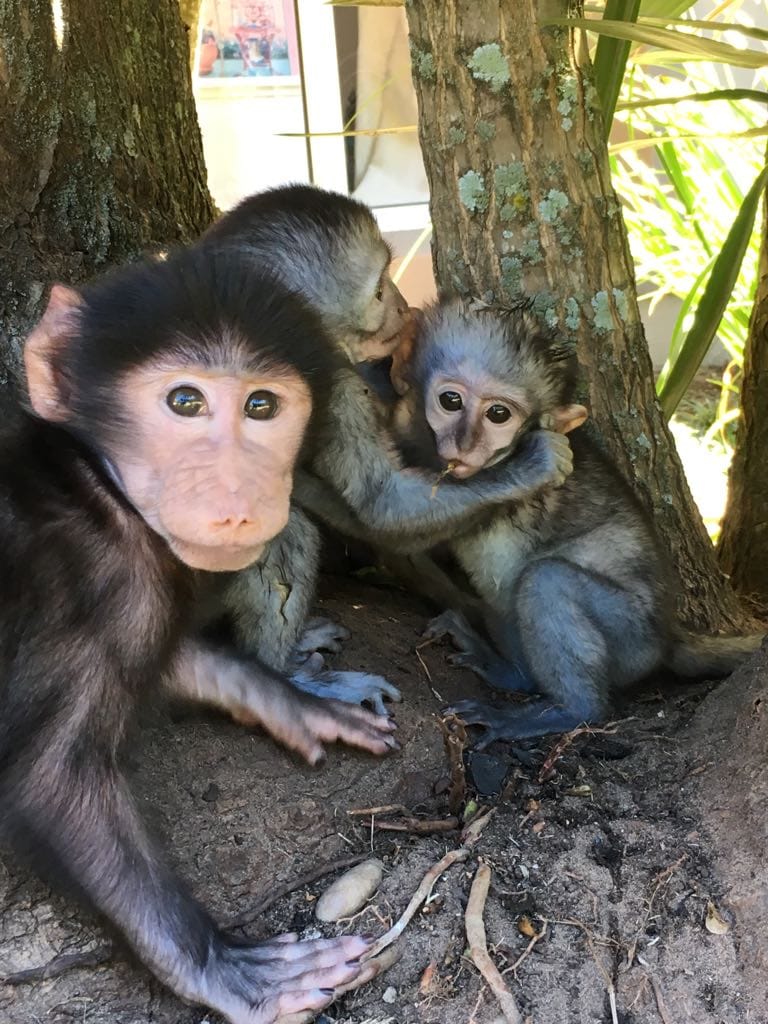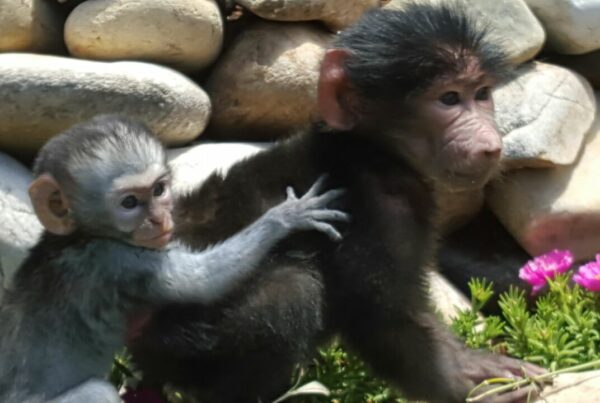Primate Behaviour
A guide to help residents understand our non-human primate neighbors and how to live cooperatively
By: Joeleen Beyers Monkey Matters
In South Africa, we are blessed to be living in a country with some of the most majestic animals on earth. Some of us live in the bush, some in major cities, some in smaller cities and some on the outskirts of town. But no matter where humans dwell, there will always be some form of wildlife that humans feel they are competing with.
Unfortunately, we all know that humans are over-populated on this planet. And because of this, our planet is suffering. Over time, some plants and animals have learned to adapt to these changes–and others have perished.
South African Baboons and vervet monkeys are not listed as either threatened or endangered. In areas where urbanization has taken over, their territory and the natural foraging areas are fragmented. With only tiny pockets of living space available, troop numbers are extremely low. These numbers are worrying to primatologists and further studies on population densities need to be addressed.
However, we do understand that no matter the size of the troop where we live, the unwanted monkey behavior can become a nuisance to residents. Some humans often feel entitled, superior to everything around them. Most do not want to see a spider in their house, a noisy hadeda on their roof or a snake in their garden. We have become extremely impatient and less tolerant of everything around us. I understand that our primate visitors are doing more than just sitting on our walls or roofs. And that the major problems arise when they enter our homes causing damage, stealing our food and pooping on counters and floors. I understand that, if threatened or cornered in your home, they can become aggressive and try to bite. These are all valid reasons for displeasure regarding their presence. But there are non-lethal solutions and methods so everyone is able to live in harmony.
Why do they do it?
Female baboons and vervet monkeys are born, live and die in one territory. Only the males are transient, moving from troop to troop throughout their lives. Their mothers, grandmothers, great grandmothers and so on, have always been in the same territory. When humans start developing in the monkey’s territory (putting up offices, farms, schools or homes) the troop will continue to think it’s still their home, albeit majorly depleted of natural food and perhaps a bit crowed and noisy. They will, however, learn to accept these disturbances and adapt. They are generally more tolerant of us than we are of them.
One way of adapting to a changed environment is to change the way they obtain food and the type of food they eat. If you have fruit trees, a veggie garden, dog food or bird seed, rubbish bins filled with household kitchen waste, they will investigate and eat it. If they gain access into your home or building and can see artificial food or know where to get it, they will eat it.
And if they can gain access, have no negative punishment and get away, they will continue to come back again and again. Think about it: the rewards they are getting outweigh the risks they are taking.
Artificial food will sustain them a lot longer than seeds and the like. And in most cases, they will not have to expend the energy of traveling more ground, to obtain little reward.
How to stop unwanted behavior
There are two main components to use when trying to stop unwanted behavior.
- Take away the access to artificial food. The only way to extinguish an unwanted behavior is to never allow that behavior to occur again. You can do this by making sure you do not feed your dogs outside, stop feeding other wildlife or domestic animals during the day, close doors and windows and stop leaving rubbish outside and exposed. Please keep in mind that you may have to only do this for a short while. Monkeys must eat to survive and if you take away the access to your food, then they will realize they must move on. Soon, they will not even bother to come back, because they only have so much time during the day to forage.
- Enforce positive punishment. Monkeys are very intelligent. They are our cousins and we certainly share many characteristics. They understand boundaries and territory. If another troop of monkeys came onto the territory of a troop and they were not welcomed, then aggression and fighting would ensue. They would let each other know who’s welcome and who’s not. If you have an area in you garden or in and around your home that you do not want the monkeys to enter, then you can instill positive punishment to show them they must not go any further. I would like to think that most people would be happy enough to enjoy their troop from a certain distance. For example, maybe you do not want them going into your windows, but you do not mind them foraging along a row of trees. You can teach them that one area is okay, but another is not. OPTIONS FOR DOING THIS:
-
- Be assertive in your actions (they can read body language very well and sense your intent)
- Chase them back to the area that is acceptable (towards their foraging route, away from your house and not towards danger)
- If you need a tool to help you feel strong and unafraid, use something that will help you feel assertive (a broomstick or long cricket bat)
- WARNING: be sure you stop chasing once they have reached the desired area (if you continue to chase them incessantly, you will eventually extinguish your authority and the behaviour you are trying to teach). Actions differ if the primate is INSIDE your house:
-
- REMAIN CALM
- Make sure they have a way out safely
- Allow them to find their way out or gently lead them in the right direction.
- Once outside, you can carry on being assertive if they haven’t already taken off towards the trees or safety
Preventative measures have been proven effective, however primates are intelligent and sometimes quickly catch on or assimilate. While these are hit or miss, they may be worth trying in your situation:
-
- placement of rubber snakes
- bird of prey statues
- scarecrows
- tin cans filled with noise makers placed around the house
- electric fencing
Positive punishment using active measures is also sometimes effective:
-
- strong water hoses or power hoses
- showing gun-like objects
- loud noise makers
If you have any further questions or need assistance, please don’t hesitate to call: Charne – 072 960 5507 Jo – 084 744 4909
-



